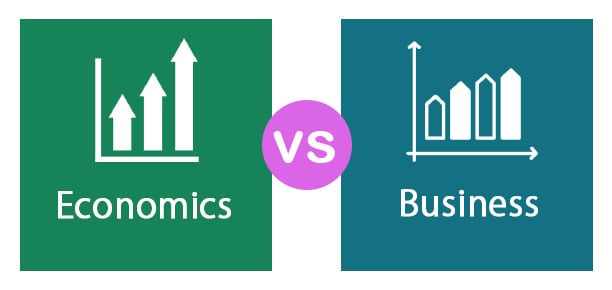Updated July 31, 2023

Difference Between Economics vs Business
Economics is a social science that studies how society uses its limited resources to satisfy unlimited human needs. It studies how the production, distribution, and consumption of goods and services are carried out. It focuses on four factors of production Land, Labour, Capital, and Enterprise. Business is a part of economics that deals with producing and distributing goods and services using four factors of production (Land, Labour, Capital, and Enterprise) to create profit out of this activity. Business can take a different form.
What is Economics?
Economics emphasizes demand, supply, foreign exchange rate, inflation, central bank policies, foreign trade, national budget, etc.
Economics can be broadly classified into two:
- Micro Economics: Micro Economics deals with individual units of the economy. Individual units can be consumers, households, firms, or industries. It studies the effect of individual unit decisions on the economy. It studies demand, supply, input cost, product price, consumption patterns, etc.
- Macro Economics: This branch of economics studies activities carried out in an economy. It focuses on key metrics such as GDP growth rate, unemployment, poverty, foreign exchange, general price levels, etc. It aggregates all the Micro Economics metrics and analyzes their impact on the economy as a whole. For example, suppose you want to study how the increased discount on a product will affect the customers purchasing patterns and the firm’s profitability. In that case, Micro Economics is the branch that deals with these aspects. If you want to analyze how a government’s interest rate reduction would affect the nation’s aggregate capital expenditure, the study deals with this is Macro Economics.
What is Business?
Business involves individuals working together in an organized way to cater to societal needs to earn a profit. It involves Marketing, HR, Finance, Accounting, Research and Development, Product Analysis, etc. Business activities also analyze a country’s political, government, and legal atmosphere to construe how it will impact their business.
Based on the nature of the activities it carries out, it can be categorized as
- Manufacturing Business
- Trading Business
- Service Business
Based on the nature of ownership, a Business can be:
- Sole proprietorship
- Partnership firm
- Private Limited firm
- Public Limited firm
Head To Head Comparison Between Economics vs Business (Infographics)
Below is the top 7 difference between Economics vs Business
Key Differences Between Economics vs Business
Let us discuss some of the major differences between Economics vs Business.
- As mentioned above, Economics is a much wider concept than Business.
- Economics carefully analyzes and interprets how individuals’ activities affect a country’s progress. In contrast, Business is more concerned about how the actions of their employees and management will affect the company’s progress and maximization of shareholder wealth.
- Economics covers the aspects such as GDP, Inflation, Unemployment, Interest rate, Supply, Demand, Balance of payment, and International trade so that it can give the central authority quality input on which key decisions can be taken for the country’s progress. In contrast, Business is more concerned about Key metrics such as Revenue Growth, Profit Margin, Leverage ratio, etc., so that management can make timely decisions to maximize the business’s profit, thus, the shareholders’ wealth.
- Managers make business decisions, whereas Economic decisions are framed by policymakers and taken by government officials.
Economics vs Business Comparison Table
Let’s look at the top 7 Comparisons between Economics vs. Business.
| Economics | Business |
| Economics is a wider concept. | Business is a subset of Economics and a narrow concept compared to Economics. |
| All Economics activities need not be a profit motive. | All Business has an objective to earn a profit. |
| Economics studies how participants use limited resources to meet their unlimited needs. | Business is an economic activity where goods and services are exchanged for money. |
| Key metrics of an Economics are Percapita Income, Exchange rate of currencies, GDP growth rate, Fiscal Deficit, Repo rate, etc. | Key metrics for business are Gross profit margin, Net Profit Margin, Asset turnover ratio, Financial Leverage, etc. |
| Economics tries to maximize the welfare of society. | Business tries to maximize the wealth of its shareholders. |
| Economics addresses key issues such as Poverty, Taxation, Unemployment, Interest rates, Government expenditure, etc. | Business addresses issues such as product positioning, Organic and Inorganic growth, Cost minimization, product differentiation, etc. |
| Economics emphasizes how scarce resources can be put to the best use. | Businesses need not always emphasize on the best use of scarce resources. |
Conclusion
Economics is a broad subject that studies how human being uses scarce resources to meet their unlimited wants. It covers large aspects and has a wider scope. Key economic metrics help the government make sound economic and political decisions to ensure the nation’s prosperity. Business is an economic activity that uses the available resources in an organized manner towards a common objective. Business always tries to maximize their profit. Activities that don’t help to contribute towards their profit fall out of their purview.
In contrast, Economics’ main objective is to maximize the welfare of society and need not always be profit-making. Sound Economic policy and decisions are prerequisites for the success of Business and the nation’s prosperity. It can improve factors like unemployment, poverty, and a nation’s life expectancy, whereas Business will not focus on these aspects. So the term Economics has a wider concept than business, and business is one of the economic activities.
Recommended Articles
This has been a guide to the top difference between Economics vs Business. Here we also discuss the Economics vs Business key differences with infographics and comparison tables. You may also have a look at the following articles to learn more –


